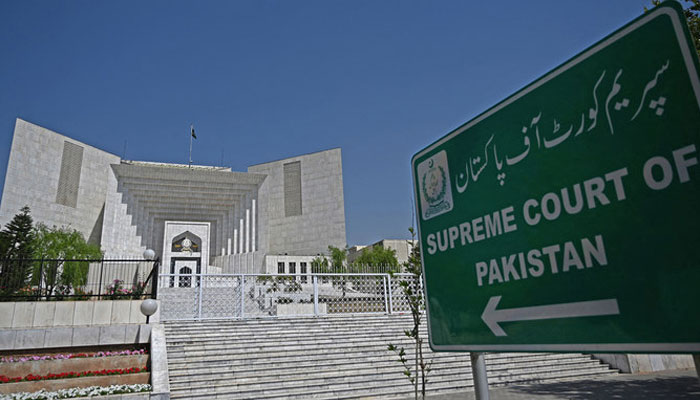Law doesn’t permit phone tapping without court permission: SC
Justice Mandokhail says phone tapping law was ambiguous and decision would affect several pending matters
ISLAMABAD: The Supreme Court (SC) constitutional bench remarked on Wednesday the law did not permit anyone to do phone tapping of anyone without the court’s permission.
A seven-member constitutional bench, headed by Justice Aminuddin Khan, heard multiple cases. Other members of the bench were Justice Jamal Khan Mandokhail, Justice Muhammad Ali Mazhar, Justice Syed Hassan Azhar Rizvi, Justice Naeem Akhtar Afgan, Justice Shahid Bilal Hassan and Justice Musarat Hilali.
The bench, while hearing a matter regarding phone tapping of judges, issued notices to advocates general of the four provinces, and adjourned the matter for date-in-office. Earlier, Justice Muhammad Ali Mazhar asked whether any legislation had been made regarding phone tapping. The additional attorney general (AAG) informed the bench that the law had been in the field since 2013, adding that as per law, the ISI and IB were notified.
He submitted that under the law, the procedure of phone tapping was also mentioned. Justice Mazhar observed that as per law, only a court could allow phone tapping, and asked the law officer as to whether any judge had been notified on this account. The AAG, however, told the bench that he was unaware of it.
Justice Jamal Khan Mandokhail observed that the law of phone tapping was ambiguous, adding the decision in the case would affect several pending matters. The Advocate-on-Record (AOR) informed the bench that the petitioner of the case could not be contacted while his counsel had died last year. Later on, the court adjourned the hearing for date-in-office (indefinite time).
Separately, the SC adjourned until January 2025 hearing of petitions, filed by Pakistan Tehreek-e-Insaf (PTI) against the alleged rigging in the general election, held on February 8, 2024, besides dismissing other petitions on the same matter for non-prosecution.
The bench then took up the petition, filed by PTI leader and MNA Sher Afzal Marwat. His counsel Advocate Hanif Rahi informed the bench that the registrar’s office had filed objections to his petition. However, he added, his client was unaware of those objections and they could not file their reply. He pleaded that they should be provided with a copy of the objections, raised by the SC Registrar’s office. The bench directed the office to provide a copy of the Registrar’s objections and adjourned the matter until January 2025.
The same stance was taken by Hamid Khan before the bench, at which the bench also directed its office to provide the petitioner with a copy of the Registrar’s objections and adjourned the matter till January next year. Justice Jamal Khan Mandokhail asked the counsel to keep contact with the Advocate-on-Record (AOR), adding that the bench had already issued a notice to the petitioner. Hamid replied that the AOR might not have received the copy of the objections of Registrar’s office and that’s why they were also unaware of it.
Similarly, the bench also dismissed non-prosecution petitions filed by Mahmood Akhtar Naqvi, Qayyum Khan and Mian Shabbir against the alleged rigging in the 2024 general election as they could not appear before the bench.
Meanwhile, the bench, while hearing a civil miscellaneous application (CMA) related to election reforms and electronic voting system, disposed of the matter for being infructuous. The DG Law, Election Commission of Pakistan (ECP), informed the bench that during the 2018 general election, the electronic voting system was utilised and a report in that regard was also filed in parliament. Justice Jamal Khan Mandokhail asked Hamid Khan to raise the issue before the Senate Parliamentary Committee. Later, the court disposed of the case for being infructuous.
Separately, the bench also dismissed for non-prosecution a petition filed by former judge of the Supreme Court Mazahir Ali Akbar Naqvi against the show-cause notice, issued to him by the Supreme Judicial Commission. Saad Hashmi, counsel for Naqvi, told the bench that he could not establish contact with the client, and sought time to seek instructions in that regard.
Justice Muhammad Ali Mazhar asked the counsel if he wanted to do anything new in the case but added that the decision of Supreme Judicial Council had come already. The court dismissed the plea of Mazahir Ali Akbar Naqvi for non-prosecution.
-
 Why Ariana Grande Wants A 'tiny Mouse' To Play Her In Biopic?
Why Ariana Grande Wants A 'tiny Mouse' To Play Her In Biopic? -
 Wind Chill Returns With Brutal Cold As Polar Vortex Stalls Over Canada
Wind Chill Returns With Brutal Cold As Polar Vortex Stalls Over Canada -
 Costco $20 Rule Explained As Employee Pay Climbs Across North America
Costco $20 Rule Explained As Employee Pay Climbs Across North America -
 Strange Incident Happened At Nancy Guthrie's Home On Abduction's 10th Day
Strange Incident Happened At Nancy Guthrie's Home On Abduction's 10th Day -
 Tumbler Ridge School Lockdown Underway As RCMP Investigate School Shooting
Tumbler Ridge School Lockdown Underway As RCMP Investigate School Shooting -
 Britney Spears Quietly Parts Ways With Her Music Catalog: Report
Britney Spears Quietly Parts Ways With Her Music Catalog: Report -
 Princess Diana Bodyguard Suspected ‘she Could Die’: Here’s How
Princess Diana Bodyguard Suspected ‘she Could Die’: Here’s How -
 Teddi Mellencamp Marks Huge Milestone With Emotional Message Amid Cancer
Teddi Mellencamp Marks Huge Milestone With Emotional Message Amid Cancer -
 King Charles Makes It ‘absolutely Clear’ He Wants To Solve Royal Crisis
King Charles Makes It ‘absolutely Clear’ He Wants To Solve Royal Crisis -
 Kylie Jenner Looks Back With 'grace' On Early Fame Years: 'Just Being Myself'
Kylie Jenner Looks Back With 'grace' On Early Fame Years: 'Just Being Myself' -
 Royal Family Warned To ‘have Answers’ Amid Weak Standing
Royal Family Warned To ‘have Answers’ Amid Weak Standing -
 Marc Anthony On Why Bad Bunny’s Super Bowl Show Mattered
Marc Anthony On Why Bad Bunny’s Super Bowl Show Mattered -
 Kid Rock Gets Honest About Bad Bunny’s Performance At Super Bowl
Kid Rock Gets Honest About Bad Bunny’s Performance At Super Bowl -
 Kylie Jenner Reveals Real Story Behind Her 'The Moment' Casting
Kylie Jenner Reveals Real Story Behind Her 'The Moment' Casting -
 Jaafar Jackson Breaks Silence On Becoming Michael Jackson
Jaafar Jackson Breaks Silence On Becoming Michael Jackson -
 Eva Mendes Admits She Was Jealous Of Ryan Gosling’s CGI ‘girlfriend’ Rocky
Eva Mendes Admits She Was Jealous Of Ryan Gosling’s CGI ‘girlfriend’ Rocky




